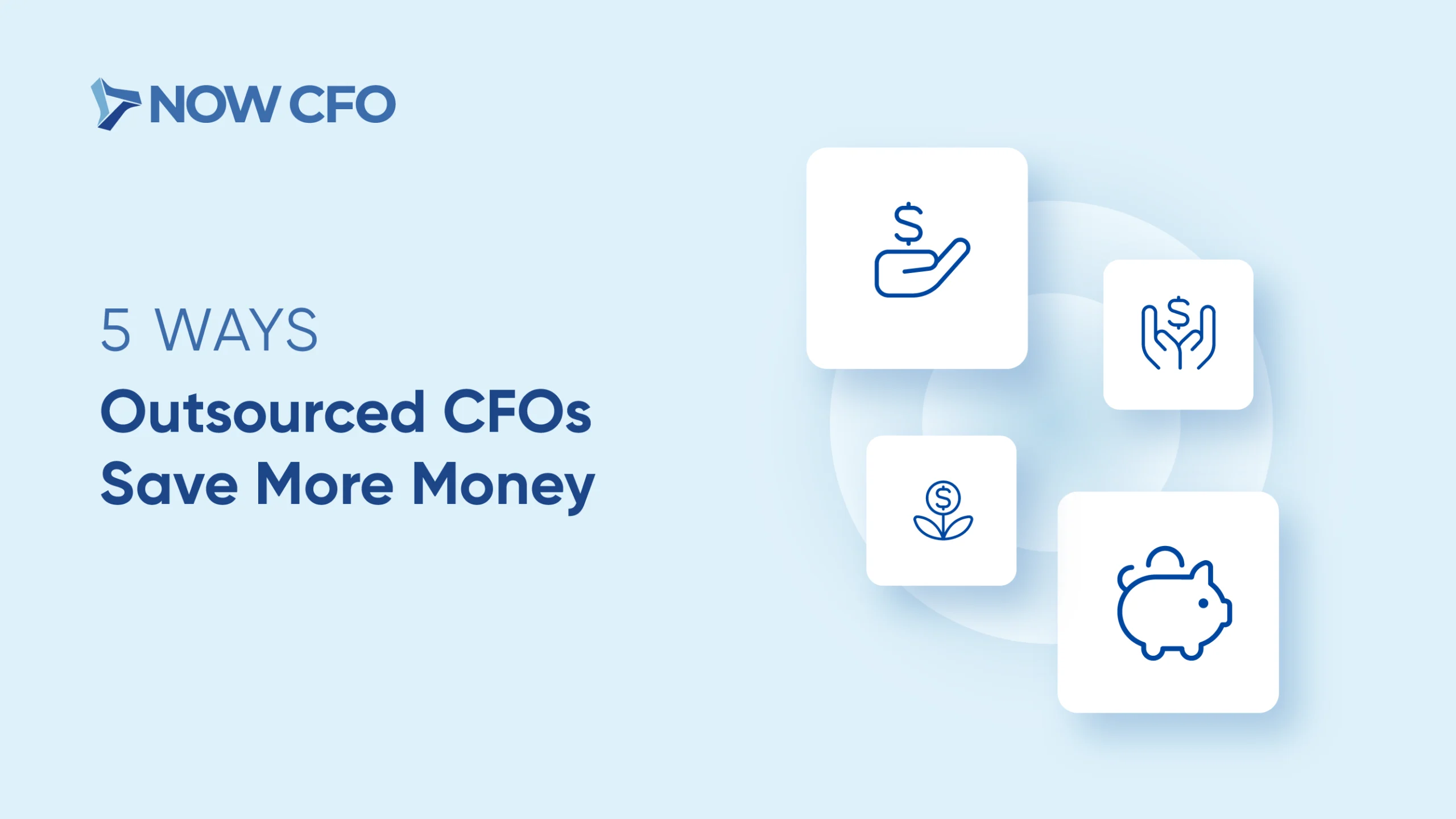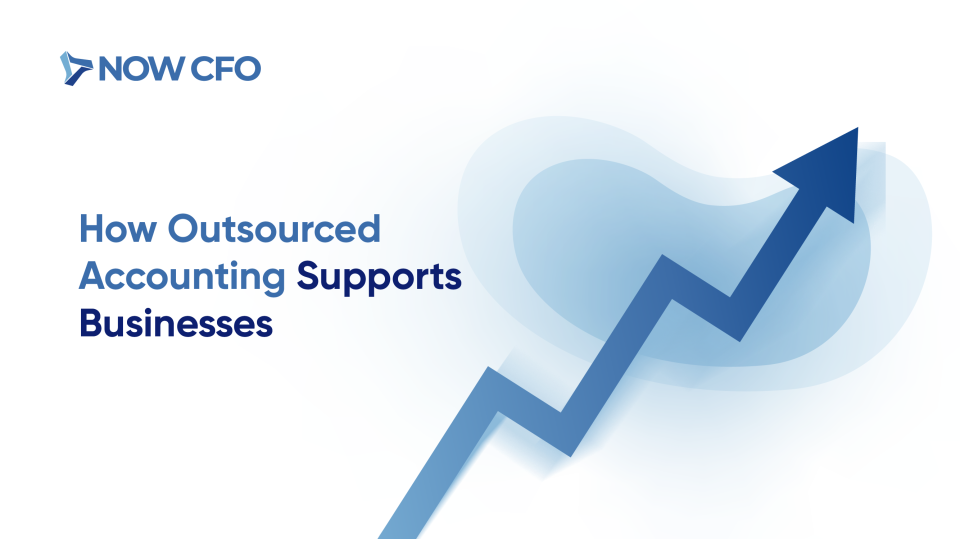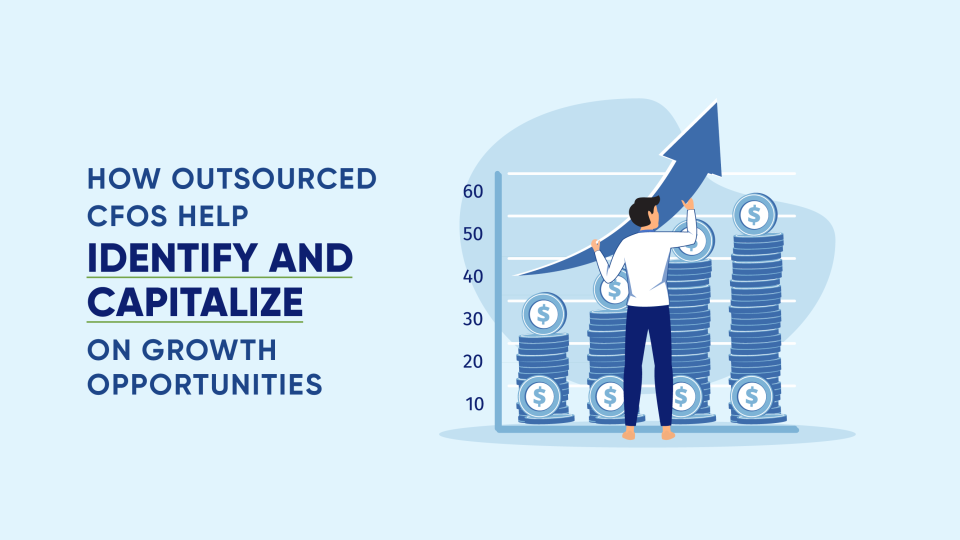
Businesses today face rapid change, increased competition, and thinner margins, making growth both essential and challenging. A survey from Business Talent Group reports that demand for interim CFOs surged by 103% year-over-year, underscoring how organizations increasingly rely on agile financial leadership during key growth phases.
Outsourced CFOs help identify and capitalize on emerging opportunities by delivering strategic financial planning, insightful modeling, and expert fundraising guidance. By tapping into financial growth strategies and leveraging CFO expertise in business expansion, these leaders empower entrepreneurs and executives to scale confidently.
The Role of an Outsourced CFO in Identifying Growth Opportunities
An outsourced CFO is pivotal in revealing factors that fuel business expansion. They guide companies toward scalable growth by applying financial acumen and strategic insights. Below are detailed breakdowns of their methods:
Conducting Comprehensive Financial Assessments
An outsourced CFO begins with a comprehensive financial assessment, reviewing historical data, profit and loss statements, balance sheets, and cash flow reports. They identify hidden inefficiencies and then benchmark performance against industry standards.
The CFO helps businesses implement financial growth strategies by aligning metrics with future goals, improving resource allocation, and reducing risk. According to BLS, 50% of small businesses fail by the fifth year, often due to poor planning.
Analyzing Key Financial Metrics to Identify Expansion Potential
CFO uses key metrics as growth indicators. They analyze EBITDA margins, ROIC, revenue per customer, and customer acquisition costs. They highlight metrics such as:
- Profit Margin Trends: Measuring operational scalability.
- Working Capital Ratios: Evaluating liquidity for investments.
- Cash Runway: Determining how long the business can sustain growth before needing funding.
Assessing Market Trends and Competitive Positioning
Moving forward, CFOs assess external factors that influence growth. They collect market size, growth rates, customer behavior, and competitive dynamics data. They use tools like SWOT and Porter’s Five Forces to understand market barriers and growth gaps.
For example, if market demand grows 8% annually, CFOs recommend strategic expansion in high-potential segments.
- Segment Growth Rates: Identifying rising markets.
- Pricing Benchmarks: Assessing competitiveness.
- Competitive Trends: Understanding rivals’ moves and differentiation.
Uncovering Internal Operational Efficiencies for Growth
CFOs link internally to identify cost-saving and productivity signals. They audit processes, systems, and workflows to find bottlenecks. They evaluate labor efficiency, tech usage, and supply chain performance using benchmarks.
CFOs recommend:
- Process Mapping: Identifying delays.
- Technology Integration: Automating manual tasks.
- Resource Allocation: Shifting capacity from low-value to high-impact work.
Aligning Financial Goals with Growth Strategies
With complete diagnostics, the CFO ensures that financial targets and strategic ambitions coincide. They have shepherd goal settings and define KPIs tied to growth, such as revenue growth rate, cost-to-revenue ratio, and capital efficiency.
They craft roll-out plans aligning quarterly goals with expansion milestones, product launches, markets, or partnerships. This alignment fosters accountability and clarity across teams. Using financial planning to capitalize on growth opportunities, leaders track progress dynamically and pivot as needed.
Key Strategies Outsourced CFOs Use to Capitalize on Growth Opportunities
Outsourced CFOs employ targeted financial techniques to build on strategic planning that allows companies to identify and capitalize on growth triggers more effectively.
Optimizing Cash Flow to Support Business Expansion
Effective cash flow management ensures liquidity for growth initiatives. CFOs stabilize inflows, accelerate receivables, and selectively extend payables.
They also build cash reserve targets aligned with expansion needs. Key tactics include:
- Receivables On Time: Implementing discount strategies can cut days sales outstanding (DSO) by 15–20%.
- Payables Strategy: Negotiating extended payment terms frees up working capital.
- Reserve Buffer: Ensuring that at least three months of forecasted expenses remain liquid.
- Liquidity Monitoring: Weekly dashboards track cash balances, burn rate, and runway.
Developing Scalable Financial Models for Growth
Outsourced CFOs build modular models that scale with the business, incorporating dynamic drivers such as pricing, volume, and costs. These models allow real-time scenario analysis and adapt to new offerings or regions.
This makes expansion more transparent and predictable. CFOs use these models to align forecasting with Outsourcing CFOs, Help Identify and capitalize strategies, and ensure financial planning for capitalizing on growth opportunities remains agile and evidence-based.
Identifying and Securing Investment or Financing for Growth
CFOs evaluate optimal financing aligned with expansion goals. They prepare investor-ready financials, valuation models, and pitch decks. They also manage negotiations, term sheets, and structure funding rounds.
By targeting appropriate sources, they ensure that capital supports strategic initiatives. Their due diligence ensures deals reinforce financial growth strategies, helping businesses identify and capitalize without compromising control or margins.
Creating Budget Plans that Align with Expansion Objectives
The CFO designs budget blueprints anchored in growth goals to convert strategy into action.
- Budget Attribution: Mapping funds to each expansion initiative—marketing campaigns, product dev, hiring.
- Contingency Setup: Classifying 10–15% reserve for route corrections.
- Milestone-based Release: Allocating funds at each KPI checkpoint.
- Variance Reviews: Monthly checks compare budget vs. actual and trigger pivot actions.
Leveraging Financial Data to Inform Strategic Decision-Making
Connecting from budgeting to tactical insights, CFOs deploy data systems that guide leadership towards informed decisions.
| KPI | Purpose | Frequency | Threshold Alert |
|---|---|---|---|
| CAC (Customer Acquisition Cost) | Understand the cost-efficiency of customer acquisition | Weekly | +10% over plan |
| Churn Rate | Gauge retention, health, and revenue sustainability | Monthly | 5% MoM rise |
| Gross Margin | Track profitability per product or service | Monthly | <3% drop |
| Segment Revenue Mix | Identify high-growth areas vs. underperformers | Quarterly | >15% variation |
How Outsourced CFOs Help Drive Strategic Growth Planning
Outsourced CFOs guide strategic expansion planning with precision and foresight to build on identifying and capitalizing growth. They construct robust frameworks that enable outsourced CFOs to help identify and capitalize on growth opportunities.
Establishing Long-Term Financial Goals Aligned with Growth
An outsourced CFO leads goal setting by connecting aspirational growth targets with measurable financial KPIs. They define 3–5-year revenue targets, margin improvements, and ROI metrics.
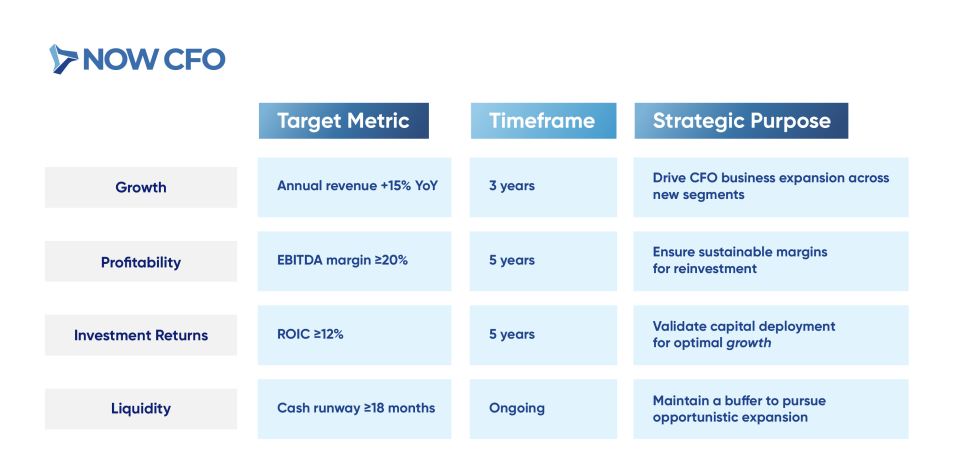
This table clarifies how financial planning for capitalizing on growth opportunities aligns with each goal.
Creating Actionable Plans for Expanding Products, Services, or Markets
Having set long-term goals, outsourced CFOs break them into executable plans. They:
- Conduct market sizing to prioritize segments, e.g., targeting regions growing at 10% annually.
- Define financial projections per initiative, detailing revenue, costs, and breakeven timelines.
- Assign resource plans, outlining budgets, headcount, and marketing investments.
- Schedule phased roll-outs—pilot → scale → full launch—reducing risk.
- Map accountabilities, who owns each milestone and KPI.
Monitoring and Managing Financial Risk as the Business Scales
As growth accelerates, financial exposure increases. Outsourced CFOs establish risk frameworks that adapt as scale increases. They categorize risk, market, operational, liquidity, and assign weightings.
They implement rolling forecasts and cash flow stress tests to preempt challenges. CFOs then trigger action plans when risks breach thresholds. This proactive stance ensures that strategic financial planning remains resilient under scale, allowing companies to identify and capitalize on opportunities without exposing the business to unmanaged risk.
Identifying Mergers, Acquisitions, or Partnership Opportunities
Outsourced CFOs scout M&A or partnership targets aligned with growth themes. They use financial models to evaluate synergies: cost savings, revenue enhancements, or market entry upside.
They build pro forma models to forecast combined performance against standalone paths. CFOs define valuation methodologies and evaluate financing options: cash, debt, equity, or earn-outs.
Supporting Leadership with Data-Driven Insights for Expansion
Outsourced CFOs ensure leadership teams receive real-time, actionable insights for informed decision-making. They deploy BI dashboards that track KPIs like customer acquisition cost, churn rate, and segment profitability. They set up automated reports for weekly, monthly, and quarterly intervals to maintain transparency on growth trajectories and triggers.
Financial Tools and Techniques Outsourced CFOs Use to Unlock Growth
These techniques enable organizations to effectively identify and capitalize on growth levers through strategic financial planning to ensure structured growth.
Utilizing Financial Forecasting and Modeling
Outsourced CFOs lead with robust forecasting and modeling to anticipate financial trajectories. Creating multi-year revenue, cost, and cash-flow models, they help businesses visualize the implications of different growth choices.
Forecasts break down into key drivers: sales volume, average price, and cost per unit, making them dynamic tools for decision-making. A study by PMC shows that firms tracking forecast accuracy via indicators like MAPE achieve up to 70% accuracy, guiding better decisions.
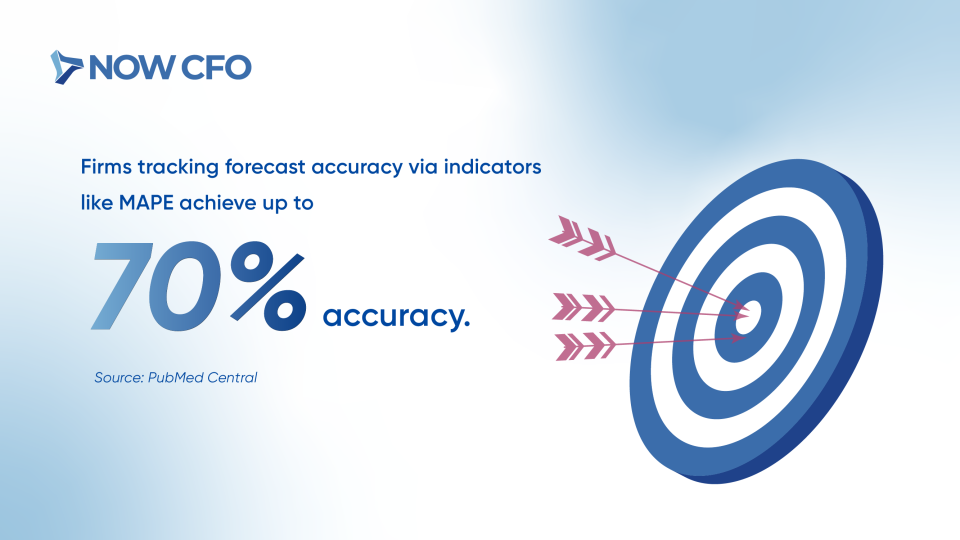
Firms tracking forecast accuracy via indicators like MAPE achieve up to 70% accuracy.
Source: PubMed Central
Implementing Performance Tracking Tools
Connecting from forecasting to real-time monitoring, performance tracking tools keep the growth engine on course. CFOs implement dashboards and scorecards to track KPIs tied to CFO business expansion, such as:
- Leading Indicators: Sales pipeline velocity and CAC.
- Lagging Indicators: Revenue, gross margin, EBITDA margin.
Balanced scorecard frameworks measure that are timely, comparable, and strategically aligned. Key features include:
- Real-Time Dashboards: Visualize week-to-date performance
- Alerts & Thresholds: Trigger notifications when metrics deviate
- Benchmark Comparisons: Compare against industry standards
- Cross-Functional Visibility: Ensure teams see performance links across operations, finance, and sales
Using Scenario Analysis to Assess Growth Risks and Rewards
Scenario analysis is at the core of prudent expansion. Under varying assumptions, CFOs create best-case, base-case, and worst-case scenarios to assess revenue, cost, and cash flow. They stress-test forecasts around key variables, such as economic shifts, supplier disruptions, and margin fluctuations.
For instance, a base-case projects revenue growth at 12%, best-case at 18%, and worst-case at 8%. CFOs then evaluate the capital buffer required under each scenario. Research from Mass.gov shows that multi-year financial forecasts serve as early warning tools.
Optimizing Capital Allocation to Maximize Growth Potential
Linking tracking and modeling, CFOs ensure capital targets high-return growth areas. They:
- Analyze ROI per project, compare investing in a new product vs. market development.
- Prioritize capital requests based on NPV and payback.
- Allocate budgets to high-impact initiatives, like marketing rather than legacy ops.
- Defer or eliminate low-value spend; e.g., expensive software with low usage.
Supporting Decision-Making With Real-Time Financial Data
Outsourced CFOs embed real-time data flows into leadership dashboards; linking ERP, CRM, and accounting systems. This integration offers minute-by-minute visibility into cash position, sales trends, customer metrics, and departmental expenditures.
They implement tools like Power BI or cloud-native dashboards that update automatically. Leadership teams can spot cost overruns, sales dips, or cash flow variances as they occur. They also receive push reports, such as daily cash balance or weekly sales vs. forecast.
Benefits of Outsourced CFOs for Business Growth
An outsourced CFO brings strategic expertise and cost efficiency, enabling businesses to scale more effectively.
Access to Expertise Without the Full-Time CFO Costs
Companies gain access to seasoned financial leadership without the burden of a full-time CFO salary and benefits. Outsourced CFOs typically charge a scalable, predictable fee, offering flexibility aligned with business needs.
By leveraging outsourced CFOs, businesses tap high-level expertise only when needed. Small firms save significant leadership costs through fractionally outsourced executives.
Improved Financial Planning and Resource Allocation
Implementing structured planning boosts organizational agility and focus:
Financial Budgeting Frameworks
- Outsourced CFOs build rolling budgets aligned with strategic financial planning, reallocating funds toward high-growth initiatives, like product development or marketing channels.
- They embed contingency buffers to absorb market shifts, preserving stability during expansion.
Resource Allocation Optimization
- They analyze cost-to-value ratios across departments, prioritizing investments where ROI exceeds the threshold.
- Outsourced CFOs reassign resources from low-impact areas to fund strategic initiatives, reinforcing business growth and expansion.
Objective Analysis to Identify Growth Opportunities
Gathering unbiased insight is critical in strategic planning. An outsourced CFO offers impartial financial assessment unclouded by internal bias. They:
- Deploy benchmarking tools to compare KPIs against industry norms.
- Conduct zero-based reviews to question all expenditures, ensuring alignment with Outsourced CFO growth opportunities.
- Facilitate decision-making sessions using data trends rather than anecdotal evidence.
Greater Flexibility in Adapting to Market Changes
Outsourced CFOs enable nimble responses to evolving market conditions. As cost-effective, on-demand advisors, they can scale support up or down based on needs, from high-intensity growth phases to consolidation periods. They routinely re-evaluate forecasts, shifting capital between initiatives to match external trends.
This flexibility empowers businesses to pivot without being locked into fixed overhead. By harnessing outsourced CFOs to help identify and capitalize on adaptive financial governance, firms maintain resilience and remain capable of swift, competitive moves.
Enhanced Decision-Making with Accurate Financial Insights
Bridging strategy and execution, outsourced CFOs supply leadership with high-fidelity financial intelligence:
- Timely Reporting: Deliver weekly dashboards on metrics like gross margin, burn rate, and AR days, enabling real-time responses.
- Scenario Modeling: Generate predictive insights (e.g., “If we reduce CAC by 10%, how does unit economics improve?”), aiding resource prioritization.
How to Choose the Right Outsourced CFO for Identifying Growth Opportunities
Selecting the right outsourced CFO is critical for enabling your business to identify and capitalize on growth opportunities.
Look for Experience in Growth Planning and Strategy
Seek out outsourced CFOs with a track record in scaling businesses and executing financial growth strategies. Ask for examples of how they guided companies through revenue ramp-up, market entry, or product expansion. Look for familiarity with modeling growth scenarios, fundraising, and KPI implementation.
Assess Their Track Record in Helping Businesses Scale
Connecting experience to outcomes, evaluating measurable impact. Ask for case studies detailing growth targets versus results, e.g., revenue increase, margin improvement, capital raised. Verify the figures: Did revenue grow by 20% YOY? Did EBITDA margin expand by 5 points post-engagement? Did ROI exceed 12% on new investments?
Review:
- Revenue Growth Achievements: Specific percentages and timeframes.
- Cost Savings or Margin Expansion: Quantifiable improvements.
- Fundraising or Financing Outcomes: Dollars raised and valuation uplift.
- Speed of Scale: Time taken to reach milestones.
Verify Their Ability to Analyze Financial Data for Growth
Connecting expertise with execution, confirm their prowess in data-driven analysis. Inquire about the tools they use: ERP integrations, BI platforms, scenario modeling. Review their ability to extract insights from P&L, balance sheets, and cash flow; generate dashboards and forecasts; and translate data into actionable growth plans.
Check:
- Depth of Modeling Skills: Can they create multi-variable growth scenarios?
- Dashboard Experience: Have they deployed real-time KPI tools for leadership?
- Data Interpretation: Ask for examples where data uncovered unexpected growth levers.
- Decision Support: How often have they enabled pivots based on financial insights?
Ensure Strong Strategic Thinking and Problem-Solving Skills
Outsourced CFOs must think strategically and resolve complex issues. Look for consultants who ask incisive questions, propose multiple growth pathways, and test assumptions. They should demonstrate the ability to break down ambiguous challenges, design frameworks, and recommend clear, prioritized actions.
Evaluate their thought process during interviews: do they analyze the competitor landscape? Consider external trends? Plan resource in/outflows?
Confirm Their Alignment with Your Business’s Growth Vision
Culture fit and shared vision enhance collaboration. Discuss your long-term ambition, market position, product roadmap, and desired financial metrics during vetting. Gauge their enthusiasm and understanding.
Look for:
- Vision Mapping: Did they outline alignment exercises?
- Communication Approach: Do they articulate ideas clearly and listen well?
- Adaptability: Can they shift focus when growth conditions change?
Conclusion: Achieving Business Expansion with Outsourced CFO Support
Ultimately, outsourced CFOs Help Identify and capitalize on growth opportunities by combining virtual CFO expertise with advanced financial acumen. They guide businesses through developing strategic financial goals, executing expansion tactics, and managing risk with agility.
Ready to elevate your growth trajectory? Schedule a free consultation or a call and connect with our experts who align perfectly with your vision. Let’s unlock your growth potential; reach out today to start scaling smarter.





